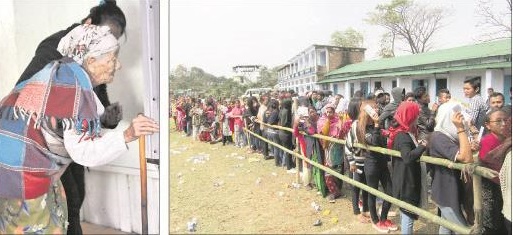Last Updated on December 20, 2024 6:10 pm by INDIAN AWAAZ
The JPC report, expected in the budget session, will play a pivotal role in ensuring initiative’s success in holding simultaneous elections across the country.

By Bibhudatta Pradhan / NEW DELHI
The Joint Parliamentary Committee will further scrutinize the bills seeking simultaneous elections for parliament, state legislatures and local bodies before they are debated by lawmakers.
Minutes before the Lok Sabha was adjourned sine die on Friday, the house adopted a resolution recommending the two bills– The Constitution (One Hundred and Twenty-Ninth Amendment) Bill, 2024, and the Union Territories Laws (Amendment) Bill, 2024– be referred to a 39-member Joint Committee of both houses.
The panel to examine the two bills will include 27 members from the Lok Sabha and 12 members from the Rajya Sabha. Among the Lok Sabha members, 17 belong to the BJP-led National Democratic Alliance, with 12 from the BJP. The panel has been mandated to submit its report by the first day of the last week of the next session, which will likely begin in the final week of January.
The proposed “One Nation, One Election” legislation aims to synchronize elections for the Lok Sabha and state assemblies across India. This would enable voters to cast their ballots for both national and state elections on the same day or within a specific timeframe. Elections for municipalities and panchayats would then follow within 100 days.
The initiative seeks to address several challenges posed by frequent elections, including curbing election expenses, reducing disruptions to governance, and enhancing the efficiency of administrative processes.
A Joint Parliamentary Committee (JPC) is an ad-hoc panel established by Parliament to thoroughly examine a specific subject or bill. It comprises members from both Houses of Parliament, representing the ruling parties as well as the opposition. The JPC is dissolved upon completing its term or assigned task.
The mandate of a JPC is defined by the motion that constitutes it. The committee has the authority to scrutinize documents and summon individuals for questioning. Upon completing its investigation, it submits a report and provides recommendations to the government.
While JPC recommendations hold persuasive value, the committee cannot compel the government to act upon them. The government retains the discretion to initiate fresh investigations based on a JPC report but is not obligated to do so, according to the PRS Legislative Research.
Supporters of the move, including the BJP and its allies, argue that simultaneous elections will help reduce campaign costs, ease the strain on administrative resources, and streamline governance.
However, critics contend that the proposal undermines India’s federal structure and the spirit of its Constitution. They caution that dissolving multiple state assemblies prematurely to align their elections with national polls could paradoxically lead to more frequent elections rather than fewer. If governments collapse mid-term and elections are subsequently held for truncated tenures, the overall election cycle could become more fragmented over time.
Some experts propose that capping campaign spending by political parties would be a more effective way to reduce election costs than implementing simultaneous polls.
Implementing simultaneous elections poses several key challenges. The proposals to hold simultaneous polls for the Lok Sabha and state assemblies every five years require constitutional amendments, without requiring approval from state legislatures. The ruling BJP-led alliance lacks the two-thirds majority needed for constitutional amendments. Provisions to align local body elections with general elections also require constitutional amendments that must be ratified by at least half of the state.
The Election Commission would face significant logistical challenges as well. It would need to manage the procurement of a vast number of Electronic Voting Machines (EVMs) and Voter Verifiable Paper Audit Trails (VVPATs), the deployment of polling personnel, and the arrangement of security forces necessary to conduct simultaneous polls across the country.
